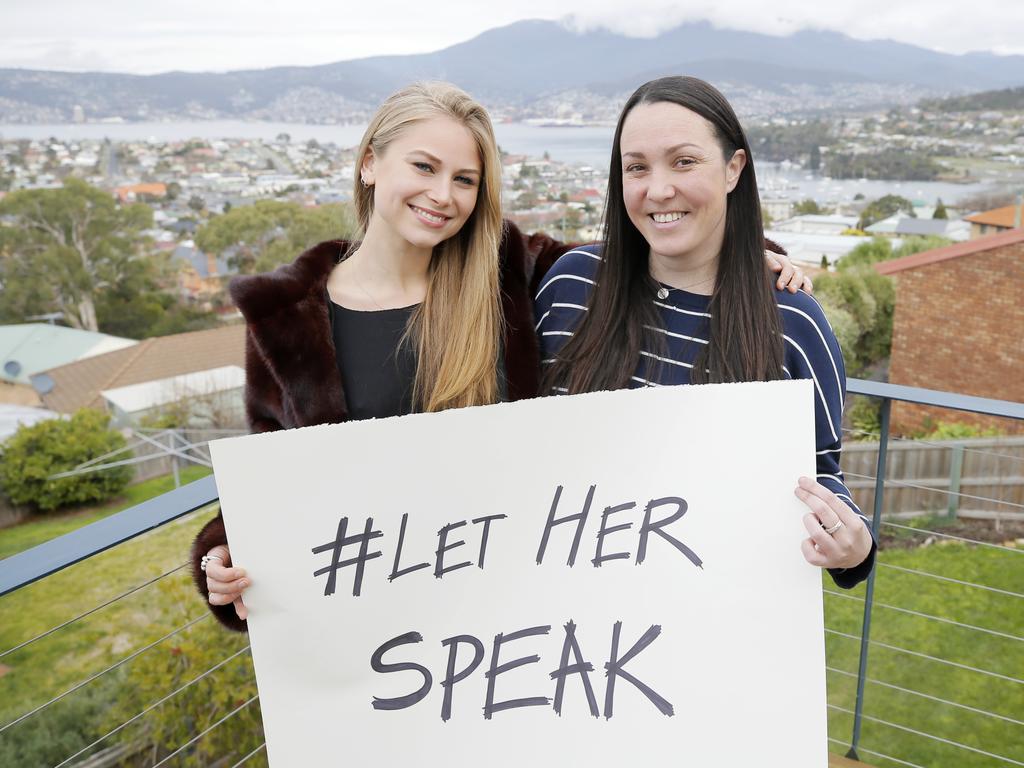‘Archaic’ Tasmanian sex abuse gag laws to be reformed
The outdated Tasmanian law that stopped Grace Tame from sharing her horrific sex abuse story with the world is finally being overhauled.
Victims of sexual abuse will soon be able to tell their stories under their own name under changes to archaic gag laws by the Government.
The Attorney-General, Elise Archer, has revealed details of the Government’s plans to overhaul the state’s sexual assault victim laws which prohibit survivors from being named in media regardless of their consent.
The Government will also explore amending the charge of ‘maintaining a sexual relationship with a person under the age of 17’, following criticism that the existing title of the offence sanitises the rape and sexual assault of children.
Both legislative changes will be released for consultation before the end of this year with a view to introducing them to parliament in the new year.
The sexual assault victim gag-law has been the subject of the #LetHerSpeak campaign, launched by news.com.au in partnership with End Rape On Campus Australia and Marque Lawyers, last year.
RELATED: Schoolgirl’s horrific sex abuse revealed
RELATED: Story that took two years to tell
RELATED: The word outraging sex abuse victims

Legislation will now be drafted to include provisions that allow victims to be named provided they are over the age of 18 at the time of publication, have the capacity to consent to being named, are not coerced, and provide that consent in writing.
There will also be safeguards to ensure the protection of victims who do not wish to be identified and any breach will remain an offence.
“Some members of the community have expressed concerns that section 194K of the Evidence Act 2001 may not currently strike the right balance and is too onerous” Ms Archer said.
“We believe what is being proposed is the most balanced approach to reform and more consistent with exemption provisions in most jurisdictions.”
“It takes immense courage for survivors of sexual crimes to speak about their experience”.
In August, and with the help of the #Let Her Speak campaign, Grace Tame became the first female sexual assault survivor in the state to win her right to self identify when speaking in the media.
This followed a $10,000 legal battle in the Supreme Court.
Ms Tame was groomed and repeatedly sexually assaulted by her 58-year-old high school maths teacher, Nicolaas Bester, in 2010, when she was a 15-year-old student at the elite St Michael’s Collegiate Girls’ school in Hobart.

Ms Tame’s family wrote to former Attorney-General Vanessa Goodwin in 2017 urging the Government to amend the name of the law Bester was charged under.
“The words ‘maintaining a sexual relationship’ soften the crime for the perpetrator and contribute to the suffering of the victim of the crime via the implication of consent”, wrote Penny Plaschke, Ms Tame’s mother.
“The scars of self harm on my daughter’s body attest to persistent sexual abuse, not a sexual relationship.”
In August sexual assault support services including Laurel House, Beyond Abuse and End Rape On Campus Australia, launched a campaign calling for the wording of the law to be brought into alignment with other jurisdictions which refer to the crime as ‘the persistent sexual abuse of a child’.

“The Government has given very careful consideration to the concerns raised in the community about the language used in Tasmania’s Criminal Code to describe sexual crimes, particularly those involving young people” Ms Archer said.
“The naming of crimes that do not clearly identify the true nature of offending has been rightly criticised by victims and victim advocacy groups as contributing to a feeling by victims that their experience and trauma is being minimised or overlooked by the justice system.”
“Therefore, the Government will also draft legislation to update the language used in the crime of ‘maintaining a sexual relationship with a young person’ in the Criminal Code.”
It is expected that the reforms will be pushed through early next year.
Nina Funnell is the creator of the #Let Her Speak campaign and a director of End Rape On Campus Australia.



